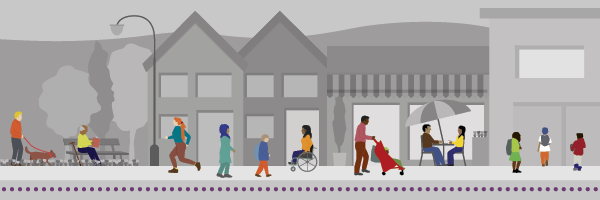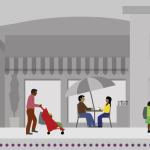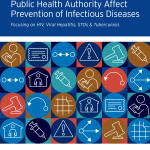Protecting Public Health Authority
Episode 4: Law, equity & the public health workforce
How can we empower the public health workforce amid the current climate of challenges to public health authority?
The rollback of public health authority catalyzed by the COVID-19 pandemic has affected the workforce training and policy needs of health departments. In this 75-minute discussion, our panelists unpack recent challenges to public health authority as well as opportunities to support the workforce in understanding public health law and its impact on health equity.
Listen to this webinar to learn about actionable ideas, promising policy interventions, and equitable policymaking strategies to support public health departments’ authority and help public health workers effectively advance the needs of children and families.
Speakers
- Sabrina Adler, vice president of law, ChangeLab Solutions (moderator)
- Samantha Bent Weber, acting health equity officer, National Center for State, Tribal, Local, and Territorial Public Health Infrastructure and Workforce, Centers for Disease Control and Prevention
- Maggie Davis, director of state health policy, Association of State and Territorial Health Officials
- Lonias Gilmore, director of health equity and social justice, Big Cities Health Coalition
- Adam Snipes, Oklahoma state campaign consultant, Local Solutions Support Center
Highlights
Pandemic policy changes. During the pandemic, we often saw policy changes that sought to undermine the ability of those who are most equipped to protect the public's health. In the courts, while many judges upheld the authority of public health officials, others veered from long-standing precedent to curtail what they saw as overreach. Many of these decisions had detrimental effects on public health in the most marginalized communities. ―Sabrina Adler
Public health restrictions. A recent measles outbreak in Columbus, Ohio, shows the dangers of stripping away public health authority. Since 2020, local boards of health can issue quarantine and isolation orders only to people who have been diagnosed. Public health officials can’t close schools or businesses except in very limited circumstances. These laws are prohibiting what used to be routine public health response tools. ―Lonias Gilmore
A recent measles outbreak in Columbus, Ohio, shows the dangers of stripping away public health authority. Since 2020, local boards of health can issue quarantine and isolation orders only to people who have been diagnosed. Public health officials can’t close schools or businesses except in very limited circumstances. These laws are prohibiting what used to be routine public health response tools. ―Lonias Gilmore
Relationship building. This new decentralization of public health measures puts the onus on school boards, community organizations, and health care providers at different levels. Relationship building between public health agencies and communities has always been an important part of public health work, but with these changes, it becomes even more acutely needed. ―Samantha Bent Weber
Public health funding. There wasn't enough trust in public health prior to the pandemic, and part of the reason is that public health was drastically underfunded. One of the silver linings coming out of the pandemic is the federal insight of needing more dedicated funding in public health — particularly for public health infrastructure and the workforce. ―Maggie Davis
There wasn't enough trust in public health prior to the pandemic, and part of the reason is that public health was drastically underfunded. One of the silver linings coming out of the pandemic is the federal insight of needing more dedicated funding in public health — particularly for public health infrastructure and the workforce. ―Maggie Davis
Local control. In Oklahoma, when our governor reopened a lot of things prematurely, our school boards and local health departments tried to take action to protect public health, but there was a lot of retaliation. It highlights the importance of local government being able to respond to their community conditions. ―Adam Snipes
Webinar Recording
This webinar is part of our 2023 virtual engagement series Equity in Action: Policymaking for Community Health. Listen to the recording:
Resources
- Association of State and Territorial Health Officials (ASTHO)
- Act for Public Health
- Making the Case for Public Health (webinar)
- Big Cities Health Coalition
- Centers for Disease Control and Prevention
- ChangeLab Solutions
- Blueprint for Changemakers (guide)
- Pathways to Policy: A Step-by-Step Playbook for Young People Who Want to Change the World (guide)
- Equitable Enforcement (collection of resources)
- Public Health Law Academy (trainings)
- Public Health Law Authority (collection of resources)
- Rural Policymaking (collection of resources)
- Local Solutions Support Center
- FrameWorks Institute, Talking About Health Equity (framing resource)
- Health Affairs, Trust in US Federal, State, and Local Public Health Agencies During COVID-19 (research article)
- LawAtlas, Laws Addressing Public Health Authority to Respond to Emergencies (legal dataset)
- Network for Public Health Law, Fighting for Public Health (report)
- Social Science & Medicine, Highlighting COVID-19 Racial Disparities Can Reduce Support for Safety Precautions Among White U.S. Residents (research article)



